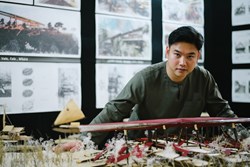A House in the Marlborough Sounds
This essay by Emma Uren was highly commended in the secondary school category of the 2017 Warren Trust Awards for Architectural Writing.
A house. The house. Our house.
It doesn’t really belong to any of us, and yet it belongs to all of us. My great-grandfather built it, and my grandfather too, right by the shore along picturesque Queen Charlotte Sound. It’s strange to imagine someone I’ve never met living and laughing in the same rooms I stand in, someone’s bare hands sawing and shaping ancient wood into a home. Maybe it was my great-grandfather’s way of leaving himself behind as a part of the hills and the trees.
My great-grandfather left instructions to sell the house after his death, and so naturally my family bought it right back. I’m glad they did: it’s a way of anchoring ourselves to the history of the place. But then, I suppose nothing really belongs to anyone; we’re all just guardians of the land, and the timber, and the warm summer nights.
It’s only a small house. The design is fairly simple, with one central room and two coming off each side. But it’s not always the largest houses that have the biggest impact. It was here I learnt the word ‘asbestos’ and was advised not to disturb the roofs of old houses.
My sister and I slept in the bunk room, which used to be a workshop, so the windows are overshadowed by high earth banks and koru ferns. It doesn’t let in much light, but I never minded much. To a child, a dim, mystical atmosphere has its own sort of charm.
I’ve come here every year I can remember. It’s as if this house, bashfully clanging in the wind, has grown right into the foliage of my memory.
It doesn’t really have a name – the house is simply referred to as ‘the Sounds’ in our family. Even that label is a lucky coincidence: it is indeed the sounds of the Sounds that resonate with me. I can still hear the crunch of narrow twigs beneath my crocs as I tramp down the bush track or the waves whipping the beach on a thunderous afternoon, tossing spray into my eyes the way we would toss sand. Those were days for huddling on the couch with a blanket and a crossword, staring bleakly out of the huge windows. Even the tiny thud of the barrels in the lock made me feel safe, barricading the angry skyline.
The weather is usually more summery, though. Or, at least, I pretend it is. One year I was so disappointed in the cold, rainy skies that I decided to go swimming anyway. The water was frigid – ‘fresh’, as my grandmother would say – and I was shaky and jittery by the time I got out. I swear the skin on my forearms was starting to turn blue, leaking into the veins. The hot shower I had after that swim – despite the half-hearted showerhead – was the best of my life.
One night as a child, I remember waking up and climbing out of my bunk bed to get a drink of water. The electric eyes of the kitchen appliances were a little spooky in the dark. My parents came inside and told me to come out and see the moon. I looked up, past the jutting roof and shadowed party
bulbs to see a great white orb, reflected without a ripple in the sea. Sometimes the sea is like that – flat and vulnerable in the moonlight. It’s amazing how dark it gets away from the city, without cars or streetlights; you can see so many stars it takes your breath away.
The bathroom door had a sporadic tendency to slam shut if we left it ajar. When I was little, I used to think it was a ghost in the house. I know it’s only a mysterious gust of wind – but I’ll tell my children about the ghost just the same.
A kereru used to come and perform acrobatics in our plum tree, but a while ago it stopped coming, and then we lost the tree in the earthquakes.
Last year, we saw weka chicks as well as the usual gathering of ducklings. It seems pretty lucky, but really, we were just spectators in their lives – or perhaps they were spectators in ours. We would spot them from time to time, picking their way across the lawn or foraging in the long grasses piled up at the back of the house.
This year will be different. I’ll be going overseas, and even if I do come back to the Sounds before life starts again in February, there’ll be a time when we drift apart. But that’s the nice thing about holiday houses. They’re there for everyone, always ready to sprout new memories, and always there when
you want to come home – however the winds blow.
Read this essay and nine others in 10 Stories: Writing About Architecture / 3 available for $15 + postage in the NZIA shop.



